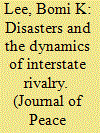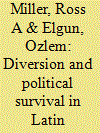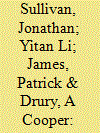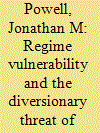| Srl | Item |
| 1 |
ID:
184188


|
|
|
|
|
| Summary/Abstract |
This article examines how disasters influence conflict dynamics in interstate rivalries. Building on insights from the disaster, rivalry, and diversionary conflict literatures, the authors argue that disasters act as political shocks that disrupt a rivalry relationship. Hostility levels in rivalries are stable over time and shift only through major shocks. While the rivalry literature suggests that some shocks may lead to peace, the authors argue that disaster shocks are more likely to be associated with increased conflict. Disasters often strain the state’s capacity to provide security for its people, while leaders who fail to prepare or respond can face domestic costs. To avoid potential removal from office, leaders have incentives to divert the public’s attention away from poor disaster response by adopting a more aggressive foreign policy. The authors hypothesize that the time between militarized disputes is shortened when pairs of states experience rapid onset disasters. However, the conditions for diversionary conflict depend on the degree of intrastate turmoil and the number of interstate rivalries, with disaster diversionary conflict happening most frequently in rivalry dyads with significant internal strife and multiple rivalries. Duration model analyses from 1900 to 2010 provide strong support for the theory and highlight the limits of disaster diplomacy in rivalry contexts. Given the increased frequency and severity of disasters globally, the findings suggest that environmental shocks are likely to increase interstate hostilities in conflict-prone regions.
|
|
|
|
|
|
|
|
|
|
|
|
|
|
|
|
| 2 |
ID:
104041


|
|
|
|
|
| Publication |
2011.
|
| Summary/Abstract |
In spite of its long history among scholars of international conflict, empirical evaluations of diversionary theory have produced contrasting-even contradictory- results. We offer three reasons for these differences: choice of unit of analysis; failure to model the reciprocal relationship between threats to the survival of political leaders on one hand, and international conflict participation on the other; and measurement error in operationalizations of the independent variable-the incentive of leaders to divert. We construct an empirical test that addresses all of these concerns. Our analysis of data from Latin America during the period 1960-99 reveals robust evidence in support of diversionary theory. The results also expose the biasing effects associated with the failure to control for reciprocal causation and measurement problems.
|
|
|
|
|
|
|
|
|
|
|
|
|
|
|
|
| 3 |
ID:
102761


|
|
|
| 4 |
ID:
128972


|
|
|
|
|
| Publication |
2014.
|
| Summary/Abstract |
In this article, I move beyond prior efforts to explore the relationship between the risk of a coup and international conflict by considering alternatives that leaders can utilize to strengthen their regimes. I offer two theoretical expectations. First, I theorize that leaders lose the incentive and ability to use diversion when the structural coup-proofing apparatus is strengthened. Second, I expect military finances to lead to disparate behavior when considering regime type. Autocrats are expected to use military funds to provide private incentives to the armed forces, largely in the form of allowances. Democracies, in contrast, will be required to use expenditures to promote the public good of national security due to the transparency of their regimes. Autocrats are expected to lose the incentive to use diversion as the financial endowment of their militaries increase, while democracies will continue to show a diversionary trend due to their increased military capabilities. The theory is tested using global data from 1962 to 2000, with the findings strongly supporting the theory.
|
|
|
|
|
|
|
|
|
|
|
|
|
|
|
|